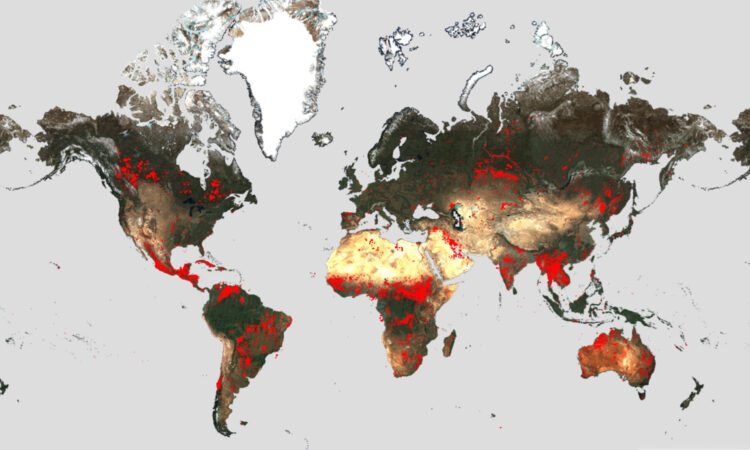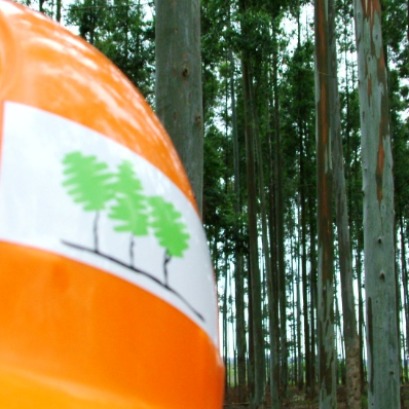
Forest fires in the world
More than 234,516 hectares of land have already been burned throughout the European Union this year alone
According to data from the European Forest Fire Information System (EFFIS). Devastating forest fires have spread across Greece, Italy, Spain, Portugal, Algeria, Tunisia and Canada in recent weeks, causing loss of life and enormous environmental and economic damage. The situation demands urgent attention and effective measures to combat the growing danger posed by these forest fires.
Although forest fires are a natural part of many ecosystems, scientists have warned that they are becoming more frequent and more extensive. In response, an updated version of the ESA World Fire Atlas is now available, offering a detailed analysis of forest fires across the globe.
The increase in global temperatures and the greater frequency of extreme weather events have caused an increase in the number of forest fires that rapidly burn large areas of vegetation and wooded land. Countries like Greece and Italy have already seen the devastating impact of large-scale fires.
According to the European Forest Fire Information System (EFFIS), as of July 29, 2023, more than 234,516 hectares of land have already burned across the European Union this year alone. The situation demands urgent attention and effective measures to combat the growing danger posed by these forest fires.
In view of the serious forest fires, the ESA has reactivated its World Atlas of Fires, which allows knowing the distribution of each of the fires that take place both nationally and globally.
Through its interactive panel, users can compare the frequency of fires between countries and analyze their evolution over time. The atlas was first activated in 2019 and has supported both European civil protection agencies and firefighters.
The atlas uses nighttime data from the Sea and Land Surface Temperature Radiometer (SLSTR) on the Copernicus Sentinel-3A satellite. The sensor, which works like a thermometer in the sky, measures infrared thermal radiation to measure11 the temperature of the earth's surface, which is used to detect fires.
Although the atlas cannot capture all fires due to satellite flyover limitations and cloud cover, it is statistically representative month-to-month and year-to-year. Data from the Copernicus Sentinel-3B satellite will be added in December 2023.
In the previous seven years, the World Fire Atlas data shows a considerable number of fires detected in Portugal, Italy, Greece, France and Spain, with the highest number of fires reached in Portugal in August 2016 and October 2017.
The data also shows that Canada has experienced 11,598 fires in the first seven months of 2023 alone. This is an increase of 705% compared to the fires detected during the same period (January 1 to July 31) of the past 6 years (from 2017 to 2022). Canada is currently battling the worst wildfire season on record in the country, with more than 10 million hectares burned, expected to increase in the coming weeks.
Olivier Arino of ESA said: “The relaunch of the World Fire Atlas represents a valuable opportunity for authorities, researchers and organizations to gain a better understanding of fires occurring around the world. Using this comprehensive resource, they can design more effective strategies for the prevention and management of fires on a global scale.
The continued commitment of ESA, Copernicus and the EU to continuously provide this valuable resource reinforces the importance of harnessing space technology to address the most significant environmental challenges."

IT MAY INTEREST YOU
 Between Rivers | Everything ready for the traditional INTA Concordia and AIANER Forestry Days
Between Rivers | Everything ready for the traditional INTA Concordia and AIANER Forestry Days
The traditional Entre Ríos Forest Days, which this year celebrate their 39th edition, will take place on November 7 from 8 a.m. to 6 p.m. at the INTA Concordia facilities, located at Yuquerí Station and Railway tracks.
 They present the Elárbol project in the Ecology Cycle
They present the Elárbol project in the Ecology Cycle
The transmedia initiative reflects the importance of Argentine native flora and focuses on the carob tree as an emblem tree. Today, at 6:�� p.m., at the Argentine Library This Thursday, October 3�, at 6 p.m., the Elárbol project is presented in the Ecology Cycle coordinated by Sergio Rinaldi at the Argentine Library.
 Real and virtual commissioning: Hymmen leverages digital twins to improve project management efficiency.
Real and virtual commissioning: Hymmen leverages digital twins to improve project management efficiency.
Bielefeld, 1�/22/25 – The ideal scenario is one in which a production plant functions perfectly even before commissioning. However, a more detailed analysis of plant projects often reveals a different reality: unexpected challenges often arise during on-site commissioning that must be resolved with considerable deadlines. Hymmen demonstrates how digital twins can offer a solution. By simulating the production process in advance on a 1:1 scale and taking into account all relevant variables, this technology allows timely intervention at critical points.





















